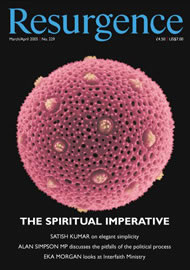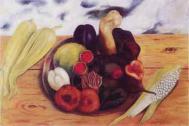THE VIBRANT ENERGY of Terra Madre came from the resilience of producers who had continued to save and share their diverse seeds, live their diverse cultures, speak their diverse languages, and celebrate their diverse food traditions. There was a community of dried-mango producers from Ouagadougou, the Baobab community of Atacora; basil growers and pesto Genovese; nomadic shepherds from India; Kirgbity sheep breeders from Central Asia; jasmine rice producers from Thailand and basmati rice producers from India. It was Slow Food, the movement that has put the culture of growing and eating good, healthy, diverse food at the heart of social, political and economic transformation, which brought together 5,000 of its members from 130 countries.
The world of Terra Madre reflected the real world of people - with diversity so dazzling it was a feast for the eyes and ears, while communities communicated with pride, joy and dignity about their agricultural and food traditions. This was not the world of the World Trade Organization where only agribusiness exists, where only five commodities (soya, corn, rice, wheat and canola) account for most agricultural trade; where only one company (Monsanto) accounts for ninety-four per cent of all genetically modified (GM) seeds planted anywhere in the world, and where most food grown is not eaten by humans but by billions of captive animals in factory farms.
In Terra Madre's world, small farms produce more than industrial farms, using fewer resources. Biodiversity protects the health of the soil and the health of people. Quality, taste and nutrition are the criteria for production and processing, not the super-profits of agribusiness.
Terra Madre was a gathering of small producers who refuse to disappear in a world where globalisation has written off diversity of species and cultures, small producers, local economies and indigenous knowledge. Not only are small farmers and local food communities refusing to go away, they are determined to shape a future beyond globalisation. As the Italian Minister of Agriculture and Forestry stated in his introduction to Terra Madre, "What is original and truly revolutionary about Terra Madre is that by selecting the food communities least susceptible to industrial process - hence distinctive for the authenticity and quality of their produce - it attempts to place small-scale food producers at centre stage."
DIVERSITY IS THE ground for the turn-around of our food systems - diversity of crops, of foods, of cultures. Diversity is both the resistance to monocultures and the creative alternative. Building on our uniqueness and variety is our strength, a strength that can be eroded only when we give up on it ourselves.
Terra Madre provided an opportunity and platform to articulate another paradigm of food. During the opening ceremony, Carlo Petrini, the founder of Slow Food, gave a call to everyone to defend the rights, knowledge and creativity of small producers all over the world. "Let us become co-producers," he said. "In the act of eating, we have already participated in production. By eating organic, we have said 'no' to toxins, and supported the organic farmer. By rejecting GMOs, we vote for the rights of small farmers and people's right to information and health. By eating local, we have taken power and profits away from global agribusiness, and strengthened our local food community. Eaters are therefore also co-producers, both because their relationship with small producers is a critical link in creating a sustainable, just, healthy food system, and also because we are what we eat, and in making food choices, we make choices about who we are."
One of the arguments used by the 'agricultural industrialists' is that it is only through intensification that we will be able to feed an expanded world population. But even without significant investment, and often in the face of official disapproval, improved organic practices have increased yields and outputs dramatically. A recent UN-FAO study revealed that in Bolivia potato yield went up from four to fifteen tonnes per hectare. In Cuba, the vegetable yields of organic urban gardens almost doubled. In Ethiopia, which twenty years ago suffered appalling famine, sweet potato yields went up from six to thirty tonnes per hectare. In Kenya, maize yields increased from two-and-a quarter to nine tonnes per hectare. And in Pakistan, mango yields have gone up from seven and a half to twenty-two tonnes per hectare.
In the inaugural ceremony I drew attention to the fact that globalised industrialised food is not cheap: it is too costly for the Earth, for the farmers, for our health. The Earth can no longer carry the burden of groundwater mining, pesticide pollution, disappearance of species and destabilisation of the climate. Farmers can no longer carry the burden of debt, which is inevitable in industrial farming with its high costs of production. The suicides of 25,000 farmers in India in a short span of six years are a symptom of the deep crisis in the dominant model of farming and food production. This system is denying the right of food and health to both the one billion who are hungry and the one billion who suffer from obesity.
It is incapable of producing safe, culturally appropriate, tasty, quality food. And it is incapable of producing enough food for all because it is wasteful of land, water and energy. Industrial agriculture uses ten times more energy than it produces. It is thus ten times less efficient. Even the labour efficiency is a myth, since all the researchers, pesticide producers, genetic engineers, truck drivers and soldiers engaged in wars over oil are part of the industrial food production system. If all the people involved in non-sustainable food production were counted, including those engaged in production of destructive toxic inputs, the 'labour' efficiency of industrial food would be lower than that of ecological food.
The fact that industrial food is 'cheap' is not because it is efficient, either in terms of resource or energy efficiency. It is cheap because it externalises all costs - the wars, the diseases, the environmental destruction, the cultural decay, the social disintegration, and it is supported by $400 billion in subsidies - transport subsidies, environmental subsidies and the largest subsidy of all, that paid through people's lives.
TERRA MADRE WAS a celebration of honest agriculture in which prices do not lie, and which does not exploit the Earth and the Earth's caretakers. Terra Madre was a celebration of our practice of living economies in which we co-produce with the earthworm and the spider, with the mycorrhiza and the fungi. We are all connected in the web of life, and it is food that spins the web. o
is the Director of Bija Vidyapeeth 'School of Seed' in India.







